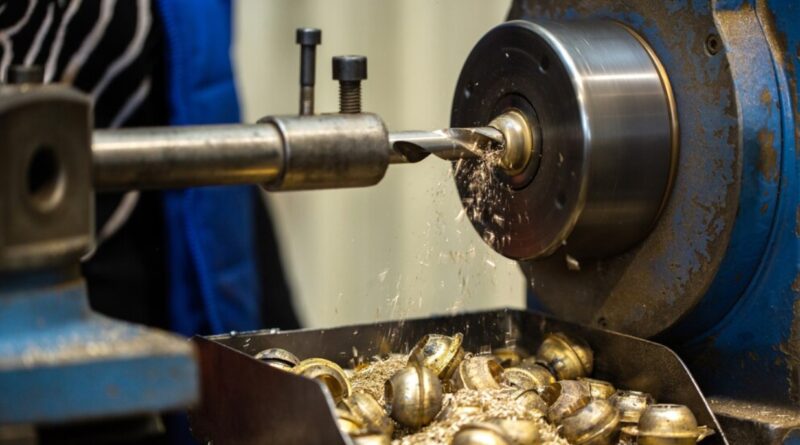Differences and Similarities Between Brass and Bronze
Brass and bronze are commonly used metal alloys in the manufacturing and construction industries today. When it comes to the similarities, both metals are known as red metals because of their copper base. As they contain various elements, they have several differences with varying properties. Brass is made up of copper and zinc, while bronze typically consists of copper and tin.
Both metals have certain similarities, but it is important to know their different properties for proper use. You can contact a good brass supplier or bronze supplier to know the differences and choose the best one for your project.
This blog shows the comparisons between brass and bronze using their properties, characteristics, and benefits. To start, let’s learn what exactly are brass and bronze-
Brass:
Brass is an alloy of copper and zinc. Depending on the specific grade, its composition with other elements includes aluminum, iron, tin, silicon, lead, and manganese. This elemental composition leads to varying mechanical and electrical properties. For instance, the presence of zinc enhances its strength and ductility. Brass is yellow or gold in color. It is known for its decorative application due to its resemblance to gold and ability to be polished to a brilliant shine.
Bronze:
Bronze is an alloy of copper and tin. Due to the presence of copper, its working properties vary. It consists of metals that include nickel, manganese, lead, zinc, silicon, antimony, and many more. Due to higher levels of copper, Bronze is reddish brown/ gold in color. It is somewhat brittle but less than cast iron. Designers enjoy ornamental and decorative uses with excellent corrosion resistance and the ability to patina. There is a range of grades in bronze to choose from for the perfect application .
Here are the comparisons between brass and bronze:
- Corrosion Resistance
Bronze is not susceptible to corrosion due to the presence of copper, especially when it is open to the environment. But when it comes in contact with chloride compounds, it corrodes easily. Due to its property to resist corrosion in saltwater, it is used for manufacturing marine parts and boat fittings. On the other hand, brass is resistant to corrosion in galvanic seawater. During the process of dezincification, brass turns pink from yellow, and this is prevented by coating a layer of bronze.
- Thermal Conductivity:
The thermal conductivity of brass is higher than that of bronze, thus, it is considered ideal for making radiators. Brass is also used in thermal applications, but bronze is more preferred when heavy thermal applications are needed.
- Electrical Conductivity:
Both metals are alloys of copper, so copper is used as the standard when determining electrical conductivity. Both metals rank low in terms of relative electrical conductivity. In comparison between brass and bronze, brass has higher electrical conductivity than bronze.
- Melting Point:
Bronze has a higher melting point as compared to brass. Thus, it is important to choose wisely the right metal for any high heat exposure project as there can be a component failure. High heat exposure can cause the material to lose its physical properties and strength. When the metal reaches its melting point, the state changes from a solid to a liquid. Thus, when it comes to shape casting, the properties of both metals should be considered.
- Weight:
When it is to compare the weight of both metals, the weight of bronze is more than brass as per the elemental composition. Water is considered the baseline for specific gravity. Bronze is heavier with a density of up to 8900kg/cu.m than brass with a density of 8730kg/cu.m.
- Hardness:
The hardness of any metal is measured by its ability to react to local surface stress, scratch, dent, and many more. Bronze is harder than brass, and that makes bronze more brittle. When it is a matter of resistance to strength and wear, bronze is a good option.
- Durability;
The durability of metals is measured by their ability to stay functional with less repair and maintenance. Bronze is a hard metal and can withstand water, which makes it highly durable as compared to brass. On the other hand, brass is susceptible to cracking which makes it less durable.
- Formability
As brass is not as hard as bronze, thus it is easier to form. The softness of brass makes it a perfect choice to shape, file and cut. Brass can be used in many decorative projects as it is good in terms of formability. You can get top-quality brass from a trusted brass supplier.
- Weldability:
Bronze and brass both are weldable through a brazing process but certain factors need to be considered while measuring their weldability. Brass containing 20% zinc offers good weldability, while unleaded bronze offers fair weldability. They become susceptible to cracking in stressed conditions. .
- Color:
Color is the simplest way to distinguish between brass and bronze. The property may change when a few other metals are added to the bronze. Brass usually comes in a muted yellow shade and resembles gold; thus, it is the perfect choice for fixtures and furniture especially when a brighter finish is desired. In contrast, bronze is reddish brown and has different applications and can patina to a darker hue for architectural uses.
- Price:
The price of bronze and brass varies as per the presence of copper content. Bronze is more expensive in the market due to the copper content as compared to brass along with the process required to manufacture.
It is common to be confused between brass and bronze for any specific manufacturing project. The article has shown a clear comparison of properties, strength, and applications; so, you can easily choose the best metal for your project.
New Mexico Metals LLC is the most trusted brass and bronze supplier offering exceptional services at affordable pricing. Their services include metal shearing, metal sawing, metal punching, and metal drilling.




